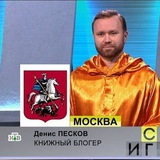Вангую: "Язык химии" И. Леенсона войдет в лист премии Просветитель этого года. Наверное, даже в короткий. Кстати, обнаружилось, что Ирина Левонтина, давшая отзыв на обложку, прочитала лишь первую главу )) Это, конечно, не грех никакой. Наверное. Но она лишила себя ещё массы удовольствий, например этого милого анекдота:
На экзамене в профессор спрашивает студента:
— Как идет реакция окисления этилового спирта азотной кислотой?
Студент отвечает:
— Сносно.
— То есть как это «сносно»?!
— Но вы же сами писали на доске: С2Н5ОН +HNO3 = СНОСНО.
#химия #научпоп #книга #книги #книжныйшкаф #нонфикшн #чточитаешь #наука #этимология #bookstagram #bookclub #book #books #nonfiction #chemistry #etymology #science
На экзамене в профессор спрашивает студента:
— Как идет реакция окисления этилового спирта азотной кислотой?
Студент отвечает:
— Сносно.
— То есть как это «сносно»?!
— Но вы же сами писали на доске: С2Н5ОН +HNO3 = СНОСНО.
#химия #научпоп #книга #книги #книжныйшкаф #нонфикшн #чточитаешь #наука #этимология #bookstagram #bookclub #book #books #nonfiction #chemistry #etymology #science
Создание атомной бомбы не было научным прорывом
"The Manhattan Project wasn’t a scientific breakthrough: Richard Feynman himself said,“All science stopped during the war, except for the little bit that was done at Los Alamos. And that was not much science. It was mostly engineering.” So it’s an interesting question why the physicists of the Manhattan Project still receive the lion’s share of the credit, while the chemists and engineers remain anonymous. I think a few factors came into play. One, you had great characters among the physicists: the court jester Feynman, the “American Prometheus” Robert Oppenheimer, the foreign savant Enrico Fermi, the Soviet spy Karl Fuchs, and so on. Beyond Glenn Seaborg, the chemists lacked for big names, and Seaborg wasn’t exactly charisma personified. Plus, physicists can be pretty chauvinistic about their domain, and it was a physicist who prepared the first official report on the bomb. It downplayed the role of chemists and thereby established a narrative that future historians followed. Finally, physicists had published most of their work on nuclear fission before the war; it was therefore public knowledge, and people could cite it freely in news stories. The chemical details for refining uranium and plutonium, meanwhile, remained classified.” #books #physics #history #nuclear #nonfiction #chemistry #book #war #bomb #nuke #книга #книги #нонфикшн #химия #физика #история #бомба #война
"The Manhattan Project wasn’t a scientific breakthrough: Richard Feynman himself said,“All science stopped during the war, except for the little bit that was done at Los Alamos. And that was not much science. It was mostly engineering.” So it’s an interesting question why the physicists of the Manhattan Project still receive the lion’s share of the credit, while the chemists and engineers remain anonymous. I think a few factors came into play. One, you had great characters among the physicists: the court jester Feynman, the “American Prometheus” Robert Oppenheimer, the foreign savant Enrico Fermi, the Soviet spy Karl Fuchs, and so on. Beyond Glenn Seaborg, the chemists lacked for big names, and Seaborg wasn’t exactly charisma personified. Plus, physicists can be pretty chauvinistic about their domain, and it was a physicist who prepared the first official report on the bomb. It downplayed the role of chemists and thereby established a narrative that future historians followed. Finally, physicists had published most of their work on nuclear fission before the war; it was therefore public knowledge, and people could cite it freely in news stories. The chemical details for refining uranium and plutonium, meanwhile, remained classified.” #books #physics #history #nuclear #nonfiction #chemistry #book #war #bomb #nuke #книга #книги #нонфикшн #химия #физика #история #бомба #война
